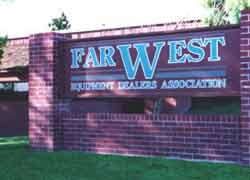 The FWEDA office in Dixon, California. |
by US correspondent Roger RenstromCalifornian regulators will impose tough emission standards on new forklifts and require engine retrofits or replacements to cut emissions on existing forklifts.
Once in place, the regulations will be the most stringent in the USA.
The California Air Resources Board (CARB) voted on May 25 to adopt more stringent emission standards and test procedures for off-road large spark ignition (LSI) engines powering forklifts, airport ground support equipment, sweepers/scrubbers, industrial tow tractors, generator sets and turf care equipment (
Forkliftaction.com News #259).
After focusing for many years on car and truck emissions, "we are now adding focus to the cleanup of engines used in off-road equipment, such as forklifts", said Robert Sawyer, chair of Sacramento-based CARB. Within the state, CARB identified 88,000 LSI engines of which 40,000 were forklifts.
Gary Cross, an attorney representing the Industrial Truck Association, of Washington, DC, said: "We believe the standard is very challenging but the final regulation is far more palatable than had been originally proposed at the beginning of this process, two years ago. "They wanted forklifts to be electric. We are pleased they did not simply outlaw internal-combustion-engine forklifts."
The regulation affects engines fuelled with gasoline, propane or natural gas, requires emission reductions of about 95 per cent versus an uncontrolled existing engine and, for the first time, calls for control of fuel evaporation emissions.
Retrofitting with catalytic converters can reduce emissions by 75 per cent on most forklift engines built since 1990. CARB will require retrofits or replacements by 2009 as one option for operators to attain acceptable fleet averages.
Revisions from the original proposal mollified many forklift dealers. CARB approved an exemption for small fleets of up to three units and provided dealers with a sales outlet for used equipment coming off lease. Previously CARB wanted dealers to be responsible for cleanup of vehicles coming off current leases.
CARB delayed implementation for users of agricultural forklifts. The burden was reduced largely because that industry tends to operate vehicles over longer periods of time. The special provision for agricultural operators applies to forklifts that cannot be retrofitted. CARB said about 60 per cent of agricultural forklifts fell into that category.
The Far West Equipment Dealers' Association (FWEDA), of Dixon, California, represented forklift dealers' interests in lobbying CARB. "FWEDA has spent a huge amount of money on this fight and probably saved dealers more than USD10 million," Joe Hensler, president of Clarklift-West Inc, in Sacramento, said. "We will likely be forced to ask forklift dealers to help us pay FWEDA back some of its costs as it represented us almost on faith." Historically, FWEDA mostly represented agricultural tractor dealers.
CARB will consider revisions for technical inconsistencies before submitting the LSI regulations to the California Office of Administrative Law for final adoption.